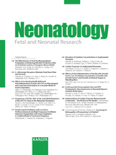
Neonatology
Scope & Guideline
Exploring the frontiers of neonatal health and research.
Introduction
Aims and Scopes
- Neonatal Respiratory Care:
Research on ventilation strategies, non-invasive respiratory support, and surfactant therapy for preterm infants, emphasizing less invasive techniques and their impact on respiratory outcomes. - Infectious Diseases in Neonates:
Studies investigating the epidemiology, diagnosis, and treatment of infections such as sepsis and neonatal tuberculosis, including the role of antibiotics and immunological responses. - Neurodevelopmental Outcomes:
Research focusing on predictors of neurodevelopmental outcomes in neonates, particularly those born prematurely or with congenital anomalies, and the implications of early interventions. - Nutrition and Feeding Practices:
Exploration of nutritional strategies, including enteral and parenteral feeding, and their effects on growth and development in preterm and term infants. - Congenital Anomalies and Neonatal Care:
Investigation of congenital malformations, their management, and associated long-term outcomes, highlighting the importance of early diagnosis and intervention. - Technological Innovations:
Development and application of new technologies such as machine learning, ultrasound, and biomarker identification to enhance neonatal care and improve clinical outcomes. - Ethics and Parental Involvement:
Discussions surrounding ethical considerations in neonatal care, including parental involvement in decision-making and end-of-life care.
Trending and Emerging
- Less Invasive Techniques:
There is a growing emphasis on less invasive methods for managing respiratory distress and administering treatments, such as surfactant therapy, reflecting a trend towards minimizing the physical and psychological impact on neonates. - Impact of Maternal Health on Neonatal Outcomes:
Research increasingly focuses on the effects of maternal conditions, such as gestational diabetes or COVID-19, on neonatal health, underscoring the importance of maternal-fetal health interactions. - Microbiome Research:
Emerging studies on the role of the infant gut microbiome in health and disease highlight its significance in conditions like necrotizing enterocolitis and atopic disorders, indicating a shift towards understanding the microbiome's influence on neonatal outcomes. - Artificial Intelligence and Machine Learning Applications:
There is a surge in the use of AI and machine learning to predict outcomes and improve diagnostic accuracy in neonatology, showcasing a trend towards integrating technology into clinical practice. - Ethics in Neonatal Care:
An increasing focus on ethical dilemmas in neonatal care, particularly regarding consent, end-of-life decisions, and the balance between aggressive treatment and quality of life. - Long-Term Outcomes of Neonatal Interventions:
Growing interest in studying the long-term neurodevelopmental and health outcomes of neonates who received various interventions, emphasizing the need for follow-up research.
Declining or Waning
- Traditional Diagnostic Methods:
There is a noticeable decrease in studies relying solely on conventional diagnostic techniques, as the field moves towards more advanced and less invasive methods such as point-of-care testing and imaging. - Pharmacological Interventions for Common Neonatal Conditions:
Research on standard pharmacological treatments, particularly for conditions like neonatal jaundice and mild infections, is becoming less frequent, possibly due to the emergence of more holistic or alternative approaches. - Longitudinal Studies on Established Interventions:
The frequency of studies revisiting established interventions, such as the use of caffeine or routine use of certain antibiotics, appears to be waning as newer evidence and practices gain traction. - Historical Perspectives on Neonatal Care:
There is a decline in articles focusing on the historical analysis of neonatal care practices, as the journal shifts towards contemporary research and future directions.
Similar Journals
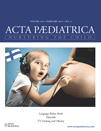
ACTA PAEDIATRICA
Elevating Child Health Research to New HeightsACTA PAEDIATRICA is a prestigious journal in the field of pediatrics, published by Wiley. With its ISSN 0803-5253 and E-ISSN 1651-2227, this journal has been a vital resource for researchers, healthcare professionals, and students since its inception in 1921, aiming to disseminate high-quality research and advancements in child health and development. Recognized for its impact, ACTA PAEDIATRICA boasts an impressive Q1 ranking in Pediatrics, Perinatology and Child Health and Q2 in Medicine (miscellaneous) for 2023, positioning it within the top-tier of medical journals, as evidenced by its Scopus ranking of #35/330 within its category. The journal covers a wide array of topics relevant to pediatric medicine, thus serving as an essential platform for innovative research and practice. Although it does not offer Open Access options, the journal continues to uphold a commitment to enhancing pediatric knowledge and influencing clinical outcomes. Aimed at contributing significantly to the field, ACTA PAEDIATRICA encourages submissions that enhance our understanding of child health, from basic science to clinical applications.

Journal of Clinical Neonatology
Elevating clinical insights to transform neonatal practices.The Journal of Clinical Neonatology, published by Wolters Kluwer Medknow Publications, is a premier multidisciplinary journal dedicated to advancing the field of neonatology through high-quality research and clinical insights. With a robust ISSN of 2249-4847 and E-ISSN 1658-6093, this journal aims to foster the exchange of knowledge among neonatologists, pediatricians, and researchers, providing a vital platform for disseminating original investigations, reviews, and case reports that address the complexities of neonatal care. Although it does not currently operate under an open access model, the journal ensures accessibility through various institutional subscriptions. Its commitment to enhancing clinical outcomes in neonates underscores the importance of sharing evidence-based practices and innovations in the field. By maintaining a rigorous peer-review process, the Journal of Clinical Neonatology is well-positioned to serve as a critical resource for professionals and students alike, contributing to the holistic development of neonatal medicine in a rapidly evolving healthcare landscape.
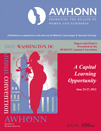
JOGNN-JOURNAL OF OBSTETRIC GYNECOLOGIC AND NEONATAL NURSING
Fostering knowledge in obstetric and gynecologic nursing.JOGNN - Journal of Obstetric Gynecologic and Neonatal Nursing, published by Elsevier Science Inc, is a leading peer-reviewed journal dedicated to advancing the field of nursing in obstetrics, gynecology, and neonatal care. With a ISSN of 0884-2175 and an E-ISSN of 1552-6909, the journal has established itself as a pivotal platform since its inception in 1972, showcasing rigorous research and innovative practices that greatly enhance patient care and nursing education. As evidenced by its 2023 impact factor and impressive Scopus rankings—ranking in the top quartile (Q1) in Critical Care Nursing, Maternity and Midwifery, and Pediatrics, and Q2 in Medicine—it provides invaluable insights for healthcare professionals, researchers, and students alike. The journal’s commitment to high-quality, evidence-based articles reflects its critical role in shaping contemporary nursing practices and informing best practices in maternal and neonatal health. While currently not an Open Access journal, the information disseminated through JOGNN remains vital for those striving to inform their practice and improve patient outcomes worldwide.
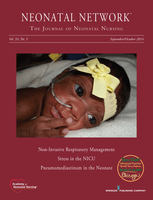
Neonatal Network
Advancing neonatal care through critical insights.Neonatal Network, published by Springer Publishing Co, is a respected journal in the field of Critical Care and Intensive Care Medicine, focusing on the complexities of neonatal health and development. With an ISSN of 0730-0832 and an E-ISSN of 1539-2880, this journal has been a vital resource for practitioners, researchers, and students since its inception in 1985. Covering a pivotal scope that encompasses Critical Care Nursing, Pediatrics, and Perinatology, it aims to enhance the understanding and treatment of newborns in critical conditions. Although categorized in the Q3 and Q4 quartiles by Scopus for 2023, its contributions remain significant, fostering a platform where innovative research and clinical wisdom converge for the benefit of neonatal care. As a non-open access journal, it provides insightful articles that are pivotal for enhancing neonatal practices and outcomes, ensuring its relevance as a distinguished academic outlet through 2024. The journal's rich history and focus on interdisciplinary collaboration make it an essential resource for those committed to advancing neonatal health.

World Journal of Pediatrics
Connecting Research and Practice for Healthier FuturesWorld Journal of Pediatrics is a prominent, peer-reviewed journal dedicated to advancing the field of pediatrics, published by ZHEJIANG UNIVERSITY PRESS. With an ISSN of 1708-8569 and an E-ISSN of 1867-0687, this journal serves as a critical platform for disseminating high-quality research focused on child health, encompassing various aspects of pediatric care, including clinical practices, policy development, and innovative therapies. As of 2023, it holds a prestigious Q1 ranking in Pediatrics, Perinatology, and Child Health, indicating its significant impact and influence within the field. Furthermore, it is ranked #9 out of 330 in Scopus, placing it in the 97th percentile, which underscores its excellence and relevance. The journal's comprehensive scope, covering emerging trends and research from 2008 to 2024, ensures that it attracts a dedicated audience of researchers, healthcare professionals, and students committed to improving child health outcomes. While the journal operates on a traditional access model, it plays a crucial role in shaping pediatric research and practice in China and beyond, serving as an indispensable resource for the global community dedicated to enhancing the well-being of children.

Journal of Fetal Medicine
Empowering professionals with cutting-edge fetal research.Welcome to the Journal of Fetal Medicine, a leading publication dedicated to the progress of research in the field of fetal health and medicine. Published by Thieme Medical and Scientific Publishers Pvt Ltd, this journal serves as a vital resource for professionals, researchers, and students alike, offering insights into the latest advancements, methodologies, and best practices in fetal medicine. With ISSN 2348-1153 and E-ISSN 2348-8859, the journal aims to provide an international platform for sharing valuable findings and clinical practices to improve outcomes for both mothers and their unborn children. While the journal is not open access, it ensures the dissemination of high-quality peer-reviewed content, promoting knowledge exchange across various subspecialties within fetal medicine. The Journal of Fetal Medicine is poised to impact the field significantly, fostering innovation and collaboration among its readership.

Case Reports in Perinatal Medicine
Innovative insights for better maternal and neonatal outcomes.Case Reports in Perinatal Medicine is a premier academic journal dedicated to the dissemination of knowledge and research in the specialized field of perinatal medicine. Published by WALTER DE GRUYTER GMBH, this journal serves as a critical resource for healthcare professionals, researchers, and students focused on the complexities of perinatal care, maternal health, and neonatal outcomes. The journal aims to foster the exchange of innovative case reports and clinical insights that advance the understanding of perinatal conditions, ultimately contributing to improved patient care and outcomes. While it offers a robust platform for research dissemination, Case Reports in Perinatal Medicine is characterized by its rigorous peer-review process, ensuring high-quality submissions. Subscribe to enhance your expertise in this vital area of medical science and to stay abreast of the latest developments in perinatal research.

Seminars in Fetal & Neonatal Medicine
Bridging Research and Practice for Vulnerable PopulationsSeminars in Fetal & Neonatal Medicine, a leading journal published by ELSEVIER SCI LTD, stands at the forefront of advancing the fields of pediatrics, perinatology, and child health. With an ISSN of 1744-165X and an E-ISSN of 1878-0946, this esteemed journal provides a platform for the dissemination of innovative research and clinical insights relevant to fetal and neonatal medicine. Since its inception in 2004, it has consciously built a reputation characterized by high-impact scholarly contributions, as evidenced by its impressive ranking of #37 out of 330 in its category on Scopus, placing it in the 88th percentile. Its classification within the Q1 quartile for Pediatrics, Perinatology, and Child Health underscores its pivotal role in enhancing healthcare practices and outcomes for vulnerable populations. While it does not offer Open Access, the journal’s rigorous peer-review process ensures that only the most relevant and high-quality studies are made available to its professional audience, fostering a rich environment for researchers, practitioners, and students dedicated to bettering neonatal care. Located in the United Kingdom at 125 London Wall, London EC2Y 5AS, Seminars in Fetal & Neonatal Medicine continues to be a vital resource for those seeking to expand their understanding of this crucial area of medicine through its convergence of research and clinical application.
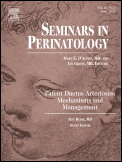
SEMINARS IN PERINATOLOGY
Connecting experts to enhance maternal and neonatal well-being.SEMINARS IN PERINATOLOGY is a premier academic journal dedicated to the field of perinatology, published by W B SAUNDERS CO-ELSEVIER INC. With an impressive impact within the Q1 quartile ranking in both Obstetrics and Gynecology and Pediatrics, it serves as a vital resource for advancing knowledge and research in maternal-fetal medicine and neonatal care. The journal is committed to publishing high-quality, peer-reviewed articles that encompass a wide range of topics relevant to clinicians, researchers, and students in the field. Spanning over four decades, since its inception in 1977 and continuing through 2024, SEMINARS IN PERINATOLOGY aims to foster dialogue and disseminate innovative insights that contribute to improving outcomes in perinatal health. As evidenced by its strong Scopus rankings—50th in Pediatrics and 40th in Obstetrics—this journal is essential for anyone seeking to deepen their understanding of these critical areas of healthcare.

Research and Reports in Neonatology
Exploring the latest breakthroughs in neonatal research.Research and Reports in Neonatology is a prestigious peer-reviewed journal published by DOVE MEDICAL PRESS LTD. As an open-access journal established in 2011, it is dedicated to disseminating cutting-edge research and insightful reports in the field of neonatology, catering to a global audience of researchers, healthcare professionals, and students dedicated to the care and study of newborns. With a focus on advancing knowledge and promoting best practices within neonatology, the journal features a diverse range of topics including neonatal care practices, disease management, and advancements in technology and therapies. The open-access model ensures that the research is freely accessible, thereby facilitating wider dissemination and impact within the medical community. Aimed at fostering collaboration and innovation, Research and Reports in Neonatology plays a crucial role in addressing the challenges faced in neonatal medicine, making it an essential resource for those engaged in improving the health outcomes of infants worldwide.